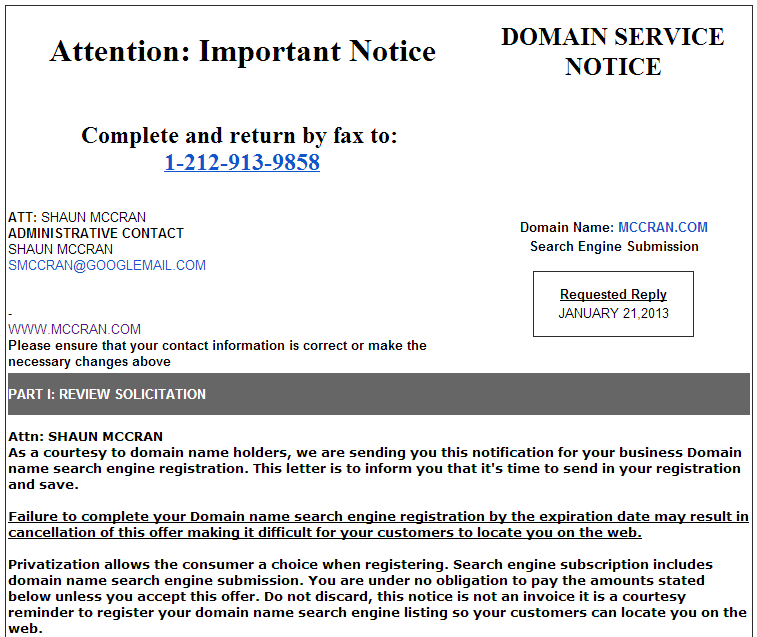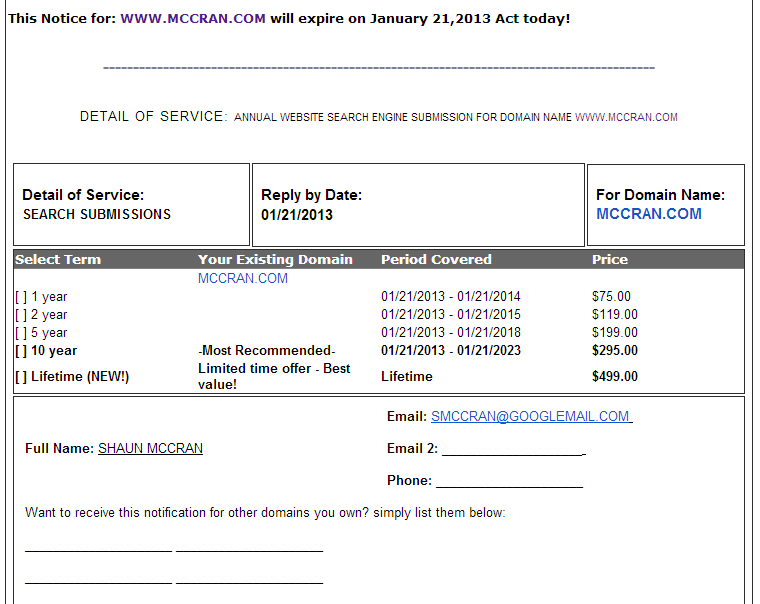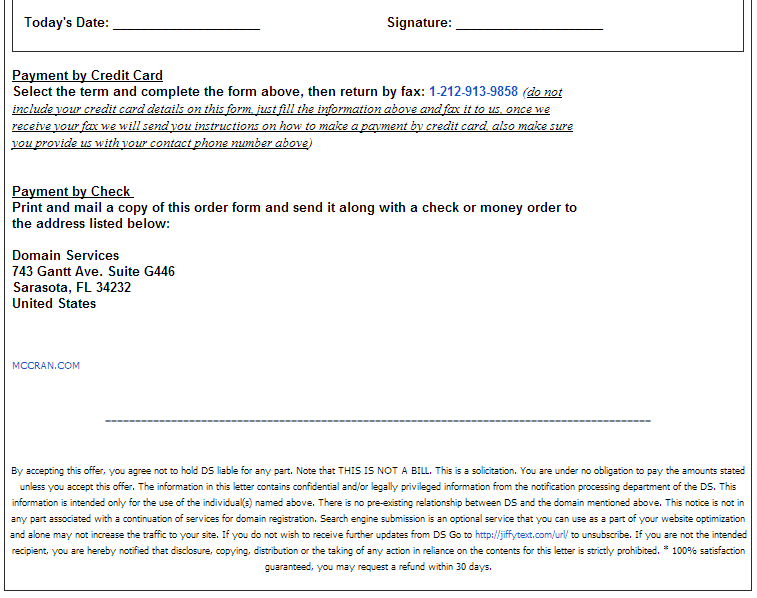|
Misleading email-con about domain search engine submission |
||||||||
One of my domains was coming up for renewal recently, it was already renewed, I'd taken care of it, done deal. I'm guessing that this rather opportunistic company was monitoring domain renewals and spotted an opportunity.
Then I got a rather bizarre looking email. It looked a lot like an invoice, and was sneakily designed and worded to look like a domain related issue. It uses lots of semi scare mongering terminology and shock value statements about offers expiring! And last chance to make sure things are in place!
The whole thing is a con to try and get you to sign up to a 'search engine submission' service. Which anyone in web technology will tell you isn't managed in this way at all. I mean it can be, but only if you want to pay over the odds for a service that largely takes place by itself, or with minimal management from a web administrator.
Shocking behaviour from this company, its not very convincing if you are technically aware, but for 'Joe public' could cause a random outburst of knee-jerk payment. Warn your less tech aware relatives.
[Screen shot of email below]
|
Smartphone data consumption now higher than Tablet data consumption |
||||||||
A recent report from Arieso shows the changing trends in mobile device usage. Interestingly Smartphone users now consume more data traffic than Tablet users. This is based on a top ten list of devices, order by data usage volume.
The report digs into detail around mobile usage for devices by brand and device type. It also looks at regional fluctuations on usage which give some interesting insight into global data consumption trends.
What's quite interesting from my point of view is the trending of device consumption.
Extract:
Users of the iPhone 5 demand four times as much data as iPhone 3G users and 50% more than iPhone 4S users (the most demanding in the 2012 study). However, Samsung Galaxy S III users generate (upload rather than download – photos, videos etc.) nearly four times the amount of data than iPhone 3G users, beating iPhone 5 users into third place on uplink data usage behind the Samsung Galaxy Note II. And in the rapidly growing tablet market, Samsung Tab 2 10.1 users have asserted their dominance - demanding 20% more data than iPad users.
This information is all based on the user operating the device, but in my experience there are considerable differences in data usage based on mobile OS (and specific version of the OS) and mobile hardware. Saying that an iPhone 5 user is a heavier user than an iPhone 4 user based on the handset is inaccurate. What else is the iPhone 5 doing in the background over the iPhone 4. A considerable amount of network traffic is not generated by the user, or is specifically user initiated.
Think about what happens when you turn on Google location services, or the Apple Facetime service polling monitor. Both of these services are continually polling against the network and location based data systems.
This is not user demand, but device and service demand. I haven't been able to work out from the report yet if this is addressed.
Also if this trend continues, does this spell the demise of the Tablet market, as users become more comfortable with mobile handset browsing?
A full article is here, along with the report: http://www.arieso.com/news-article.html?id=138
|
SMS turns 20 years old today |
||||||||
"On December 3 1992, engineer Neil Papworth sent the first SMS message to Richard Jarvis of Vodafone. It simply read "Merry Christmas", and Jarvis had no way of replying."
The Short Message Service turns twenty years old today. It's hard for us to consider a world without such common technologies as the SMS and easily accessible mobile communications but think about that statement for a second.
SMS is only twenty years old.
Only twenty years ago a technology came along that has radically changed the way people communicate, in both business and social environments. Think how much harder things would be now if SMS wasn't easily available? The most amazing thing about SMS is that is isn't all that complicated in comparison to most smartphone functionality. SMS is accessible to everyone with a mobile, through a common interface. It doesn't require a special network protocol or data system, it is truly available to everyone, all around the world.
Think about the impact that SMS has had on changing the English language, think of how much English has changed due to the short nature of messaging, look at terms we are all familiar with now (Lol, BRB) that have come around specifically due to human interaction with the SMS technology.
From its humble beginnings things have changed. People are innovators, and they have driven the SMS message on to greater and greater things, like MMS and now modern messaging services like WhatsApp and Skype. These are all essentially driven from the SMS concept.
You can read a lot more information about the background of the SMS here, from the Telegraph:
Or the Guardian:
http://www.guardian.co.uk/technology/2012/may/06/sms-text-messages-20th-birthday
My thinking is that the mobile landscape is still a very new and exciting environment. The technology landscape is still forming and innovations like SMS are frequent and game changing.
The coolest thing about SMS technology for me? Working for the company that made SMS a reality, and that 4 billion people use every day.
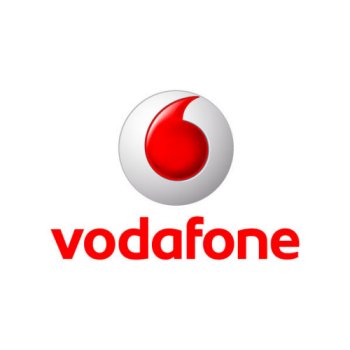
|
Razer create a totally unnecessary cloud based system |
||||||||
A recent blog post on www.overclock.net sparked my interest in a particularly strange decision from Razer. Razer are a hardware manufacturer that produce gaming peripherals, like Mice and Keyboards.
To use your new Razer device as the amazing multi button, Macro driven gaming peripheral that it was designed as, you have to have an account and a profile with them. Without this account your mouse reverts back to a 2 button standard Microsoft mouse.
To facilitate this account Razer have released a new version of their peripheral profiling software, Synapse 2.0. Synapse 2.0 requires allows you to create an account to store your profile information against, things like settings and device profiles. Users have noticed that this software creates your account in a Cloud space. This has the knock on effect of a user having to be online when they create the account, and being online every time they want to use the device.
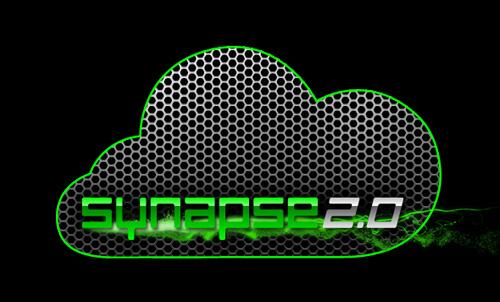
Essentially if you aren't online then your account cannot be verified and your settings are not used. Now if I were writing requirements for mouse management software, being cloud based would not be one of them. There is one tenuous reason for a cloud based profile (same mouse used on multiple machines) but other than that the only technical reason I can see for doing this is tracking.
Razer just want to know what you are doing. It's all about usage stats and product tracking. By doing this they now have a profile of exactly which of their devices are in the market, and the numbers of those devices. Couple this with average life of a device and you start to get pretty good sales forecasting, if you can work out how many people will re-purchase one of your products if the existing one fails.
But I can't shake the feeling that this is a really poor use of a Cloud based solution. The user gains nothing from it at all, and is restricted at a fairly fundamental level if they don't agree with it. Personally a software firewall will block this every time for me, and I can't think a decent reason to let it through.






